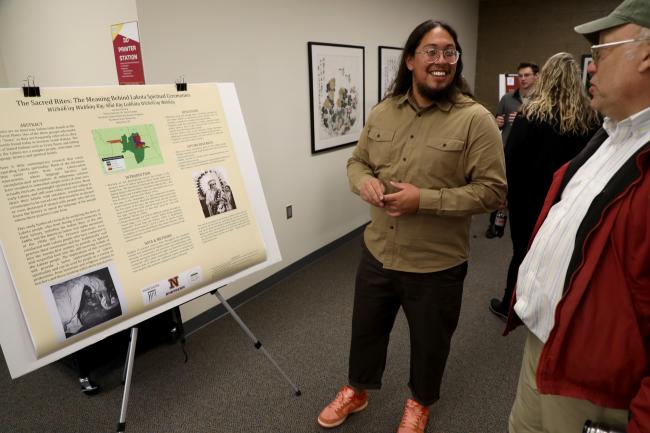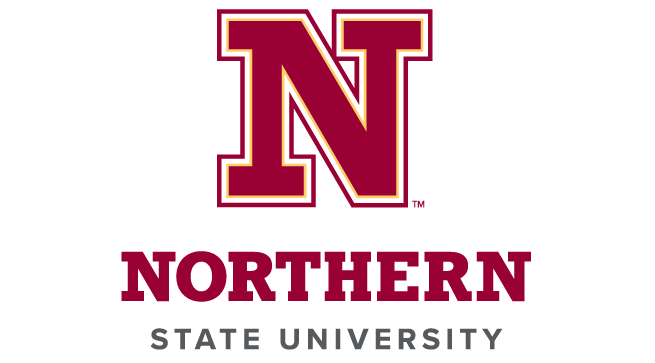
Caption: Jaeden Shaving, middle, presents his Honors research poster to Dr. David Grettler, far right, at Northern State University. Honors students presented their research to the university community before heading to Chicago.
ABERDEEN, S.D. – A Northern State University student has placed highly at the National Collegiate Honors Council annual conference for the third year in a row. Jaeden Shaving brought home a first-place win in the diversity poster category for his research titled “The Sacred Rites: The Meaning Behind Lakota Spiritual Ceremonies.”
Colleges across the United States as well as institutions from six other countries participate in Nationals. Admission to the conference is very competitive, with only 60% of submissions being accepted. For eight of the last ten years, Northern has had a 100% acceptance rate.
“Nationals is an amazing opportunity for students to present their undergraduate research on a big stage,” said Kristi Bockorny, director of the Honors program and associate professor of management. “Students see their hard work and dedication pay off. They share what they’ve learned and why they are passionate about a topic with their peers.”
Shaving said he had a great time networking and discussing his research in Chicago.
“One of my judges had worked a lot with Native American literature from the 1960s and 70s–the same era that the American Indian Movement was going on–and we were able to have a very fun discussion about that,” Shaving said. “She asked me some questions about my connection to my research topic and personal life that in trying to answer, gave me a better understanding of why my research mattered to me. Another judge was a historian who had worked with oral societies, and he gave me some helpful advice on unique things about my research to focus on as I continued, that I hadn't even realized were as potentially interesting as he suggested.”
Honors students who have completed Honors 390 can apply to Nationals. Shaving encourages anyone with the opportunity to apply to do so.
“Even if you're accepted, you don't have to go. That was my mindset; I just wanted to make sure I didn't close the door on that opportunity,” Shaving said. “You don't have to have it all figured out before going either. I haven't changed topics, but I've altered my focus since applying for Nationals last semester.”
Shaving’s inspiration for his research came from his capstone history class with Dr. David Grettler, Northern professor of history.
“I started researching the American Indian Movement. As I learned more about AIM, I realized how (at least in my opinion) influenced by traditional Lakota spiritual beliefs they were. I'd been doing a lot of reading about that topic ever since, so when I started working on my Honors thesis last year, it was already on my mind and I knew it would be something I'd have fun researching,” Shaving said.
This year, 11 Northern students were accepted into Nationals, and nine were able to go. Since the conference moves around the country, it’s an opportunity for students to go somewhere different, somewhere they might not have been before, Bockorny said. The conference provides an in-depth look at the host city through a program called City as Text.
“Even if you're unsure of where you're going with your research, at least you'll get a free trip to a cool city out of it,” Shaving said.
This year, students had a chance to tour Chicago. The students broke into small groups to explore different parts of the city and then regrouped to share their experiences.
“It’s always fun seeing what students notice about the city,” Bockorny said. “There’s also some form of appreciation of home that comes from traveling.
Although Shaving plans to take his research further, it might not be in a professional setting. Shaving, who is set to graduate May 2024 with a major in history and a minor in Native and Indigenous Studies, is still deciding whether he wants to get his master’s to teach history at the high school level or collegiate level.
National’s attendees and their research titles
- John Jacklin – A Comparison of Newspaper Sports Sections Between Western and Eastern European Countries
- BriAnna Linn – Are the Returns on Post-Secondary Education Becoming Obsolete in the Workforce: Evidence from the Midwest
- Peyton Melius – Education vs. Implementation – Inclusion of Students with Special Education Needs in Physical Education
- Jeremy Pasara – To Trick an Auditor
- Randi Schuster – The Mismanagement of Autism in the General Education Classroom
- Jaeden Shaving – The Sacred Rites: The Meaning Behind Lakota Spiritual Ceremonies
- Trent Shuey – The Julio-Claudian Emperors: An Analysis of Who They Patronized
- Darius Swanson – Promises Made, Promises Forgotten: Dangers that Demagoguery Presented with the Advancements of Modern Politics and the Media
- Sierra Sweeney – The Relationship Between Lower Extremity Stress and Injury Risk in Triple Jump Athletes
